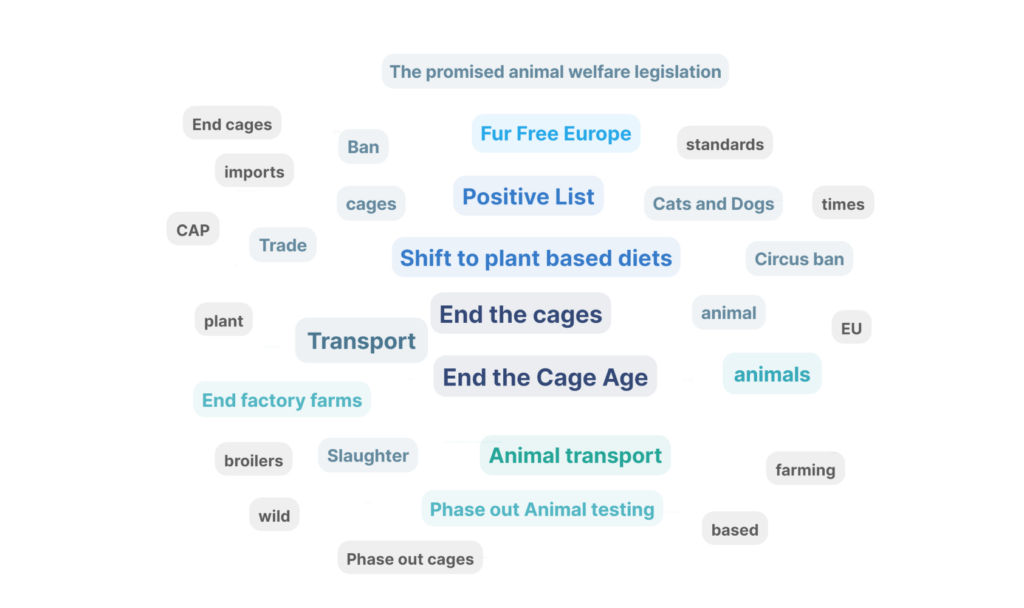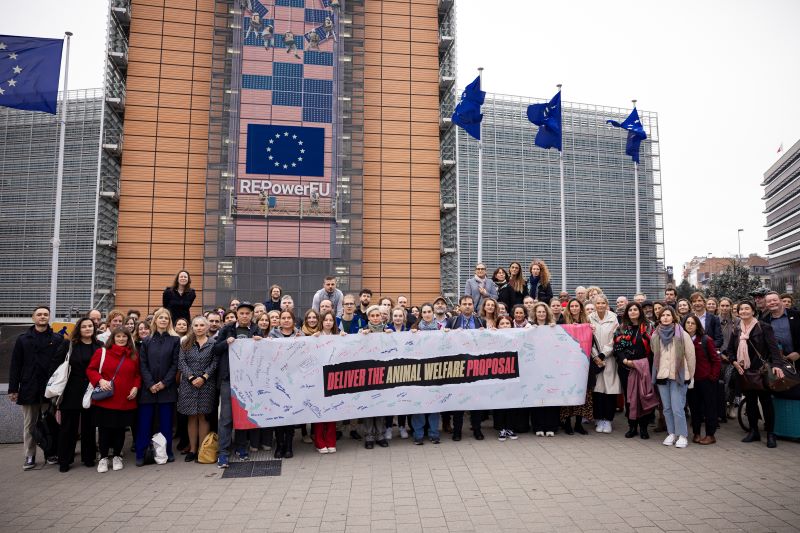Members of the European Parliament across all major political party groups called last week on the new European Commission to deliver on its commitment to revise EU’s outdated animal welfare legislation and to submit legislative proposals based on European Citizens’ Initiatives.
The call was raised at Eurogroup for Animals’ Annual Conference which also included a photo exhibition, “Silent Suffering”, on the hidden cruelties animals are facing in the EU. The exhibition featured photographs across nine categories, including cage-farming, transport, broilers, aquatics, fur farming, animals used in science, large carnivores, pets and trade issues.
The exhibition was hosted by animal welfare organisations FOUR PAWS and Eurogroup for Animals. Over 16 animal welfare organisations contributed the images from their investigations and activities on the ground.
Unweaned calves transported for up to 21 hours without enough food or water, laying hens spending their entire life in cages the size of approximately an A4 page, and millions of foxes, minks, racoons and other animals killed each year for their fur. This was just a glimpse of some of the realities of animals in the EU.
“This exhibition is a visual reminder of the suffering that animals in Europe continue to face, often behind closed doors, silently,“ commented Reineke Hameleers, CEO of Eurogroup for Animals. “These sentient beings don’t have a voice in politics, but citizens do, and they have been vocal in their calls for better animal welfare legislation, one that adequately protects animals across their lifetime.”
MEP Niels Fuglesang (DK, S&D), the new President of the Parliament’s Intergroup on the Welfare and Conservation of Animals, welcomed the Commission’s proposal for a dedicated animal welfare Commissioner but cautioned that it at first glance looked symbolic and that the mission letter was vague.
Asked by The Brussels Times if the proposal was credible, he replied that, “We have some power in the hearings and will ask all the questions we need answers to. He needs our votes to be elected.” The hearings will take place in beginning of November.
It will also be important to question the Commissioner-designate for Agriculture and Food as the issue of factory farming is part of the EU’s common agricultural policy (CAP).
We need to hold the new Commission accountable, he added, and adopt the proposals that already are on the table, such as legislation on live animal transports and animal welfare of companion animals (pets), but also those that the Commission promised but has not yet tabled. He mentioned that he once followed a transport of live pigs from Denmark to Italy, which was a horrible experience.
The pro-animal welfare MEPs will need to mobilize a majority in the new Parliament. MEP Michal Wiezik (Renew, SK) was satisfied with the outcome of the strategic dialogue on the future of EU agriculture but cautioned that opinions on better animal welfare are divided 50/50 in the Parliament. He did not expect that the transport legislation will be adopted during the Hungarian EU Presidency.
MEPs agreed that animal welfare is still considered a “soft” political area but it is changing because more and more MEPs and citizens care about it and want to legislate on the basis of facts and science.
While caring for different animal welfare issues, MEPs from EPP, S&D, The Greens, Renew, The Left and ECR were united in the panel in their calls for improving and enforcing EU’s animal welfare legislation. Both the panel and the audience were asked about what should be the top three priorities for the new Commission.

Slide showing results of interactive poll on the three top animal welfare priorities, source: Eurogroup for Animals
The European Citizens’ Initiative on ending the use of cages for farmed animals received most votes and was ranked as the first priority, followed by shifting to plant-based diets, legislation on pets (positive list of animal species that have been determined as safe and suitable to be kept as pets) and live animal transports.
The issue of animal welfare at slaughter was not prioritized although the Commission was supposed to revise the legislation on stunning methods at slaughter. Benny Andersson, a Swedish animal welfare activist and CEO of Project 1882, told The Brussels Times that Sweden is not waiting for the Commission to take the lead in reviewing the current painful stunning methods for pigs and poultry.
M. Apelblat
The Brussels Times

